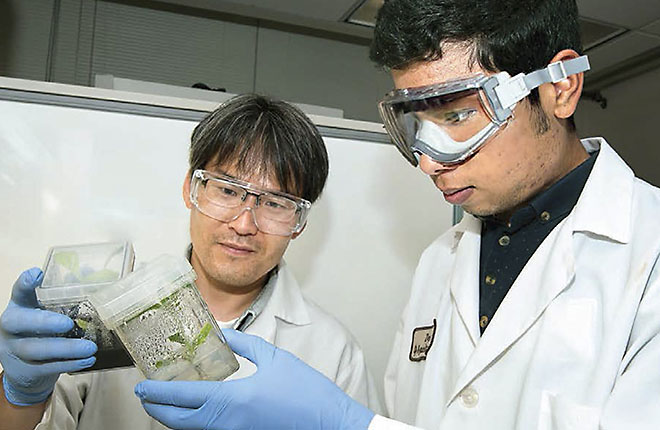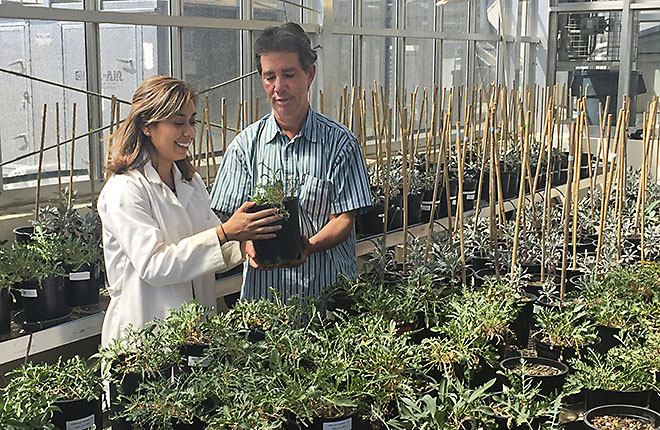Project SEED: “Growing” Tomorrow’s Scientists
This month marks over 40 years of participation by Agricultural Research Service researchers in “Project SEED,” an educational outreach initiative of the American Chemical Society (ACS). The program has provided mentoring and hands-on research experience to several thousand economically disadvantaged high school students with interests in the chemical sciences and engineering.
The 9-week program begins each June. Eligible high school seniors from low-income families across the country are paired with scientist-mentors based on the students’ locations, demonstrated interests, and teacher recommendations, among other qualifications.
The late Glenn Fuller, a chemist with the ARS Western Regional Research Center (WRRC) in Albany, California, was instrumental in making ARS the first federal agency to partner with the California Section of ACS on Project SEED. ACS president Alan Nixon created the program in 1968. Fuller teamed with Elaine Yamaguchi, then a chemist with Chevron Corporation, in 1983 to extend the program to students throughout the San Francisco Bay Area and to recruit more scientists as mentors—first from WRRC and then from other ARS locations in northern California.
Project SEED (short for “Summer Experience for the Economically Disadvantaged”) sponsors about 500 participating students annually—11 of whom interned at ARS labs in California in 2015, notes Wally Yokoyama, the current ARS project coordinator. ARS has hosted more than 300 SEED students over the years.
Students work a paid, 40-hour week alongside their mentors in conducting actual research projects on chemistry-related topics. Examples of past projects include peptide analysis using mass-spectrometry methods, chemical analyses of contaminated soils, design and synthesis of enzyme inhibitors, and decoding viral ribonucleic acids. The topics change from year to year, notes Yamaguchi. The students also receive extensive safety training before they begin work. And before finishing, they must submit a written report on their research and present it orally. Many Project SEED alumni have won ACS-sponsored college scholarships of up to $5,000 for their freshman year in the areas of chemistry, biochemistry, chemical engineering, and other related fields.
Project SEED is more than simply exposing students to the world of science. It also creates a professional working environment in which students gain confidence in their abilities as they prove themselves an asset to their mentors, says Yokoyama.
“With this program, I have the opportunity to mentor a gifted underrepresented high school student for 9 weeks. They have the opportunity to independently supervise a small experiment, which can be completed, including the writing and presentation of a scientific report, within that time,” says Gary Bañuelos, a soil scientist at ARS’s Water Management Research Unit in Parlier.
Over 75 percent of SEED graduates continue their science interests in college. Among them:
• Julique Lewis (Kennedy High School)—interned at WRRC in 1988 and earned a chemical engineering degree from the University of California-Los Angeles. She later landed a position with Bio-Rad, a life sciences and clinical diagnostics company headquartered in Hercules, California.
• Phoebe Sun (Albany High School)—interned in 1990 with Maura Bean (retired, WRRC) and earned a biology degree from the University of California-Santa Barbara. Sun now works at Glaxo-Smith Kline in North Carolina.
• Braulio Garcia-Perez (El Cerrito High School)—interned with mentor Colleen McMahan at WRRC’s Bioproducts Research Unit in 2013 and returned for a while as a part-time employee. He is currently a student in the Peralta Community College District.
“Everyone needs a place to start on their journey to adulthood,” says Yamaguchi. “SEED and the USDA partnership represent an excellent investment in the future of the American workforce.”—By Jan Suszkiw, ARS Office of Communications.
“Project SEED: “Growing” Tomorrow’s Scientists” was published in the June 2016 issue of AgResearch Magazine.
Key Facts
- “Project SEED” is a science internship for economically disadvantaged students.
- ARS has hosted Project SEED students for 40 years.
- The American Chemical Society founded the program.
Full Story








